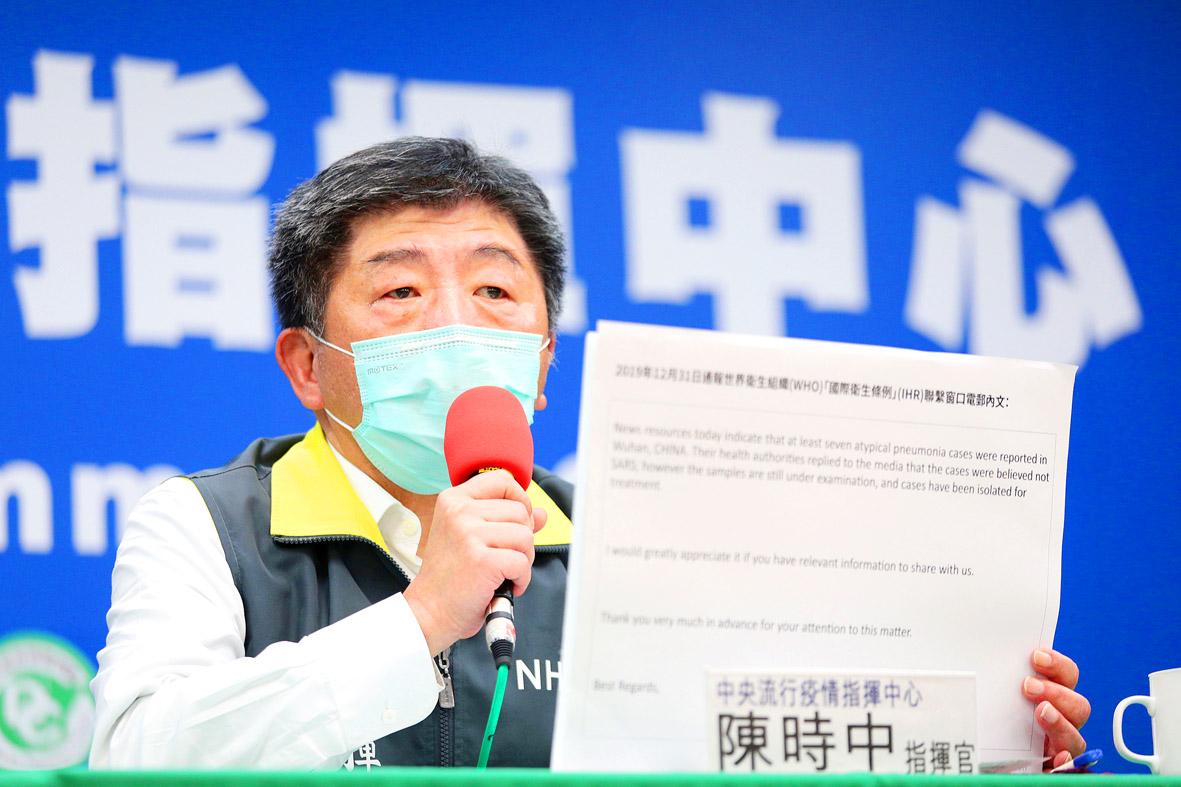Minister of Health and Welfare Chen Shih-chung (陳時中) yesterday urged the WHO to be honest as the Central Epidemic Command Center (CECC) published the e-mail it had sent to the world body in December last year alerting it about the risk of an outbreak in China.
The WHO on Friday said it received an e-mail from the Ministry of Health and Welfare on Dec. 31 last year, but added that “there was no mention in the message of human-to-human transmission.”
During a news conference at the CECC in Taipei yesterday, Chen read out the Centers for Disease Control’s (CDC) e-mail to the WHO International Health Regulations (IHR) Focal Point on Dec. 31 last year.

Photo: CNA
“News resources today indicate that at least seven atypical pneumonia cases were reported in Wuhan, China,” the e-mail read. “Their health authorities replied to the media that the cases were believed not SARS; however, the samples are still under examination, and cases have been isolated for treatment.”
“I would greatly appreciate it if you have relevant information to share with us. Thank you very much in advance for your attention to this matter,” it added.
China commonly uses the term “atypical pneumonia” to refer to SARS, but Chinese authorities had been ambiguous in describing the novel coronavirus as “an atypical pneumonia, but not SARS.”
“The e-mail specifically noted that patients had been isolated for treatment,” Chen said. “Any public health expert or medical professional would know what circumstances would require patients to be isolated for treatment.”
As there were no confirmed cases in Taiwan at the time, the CDC could not definitively state that there had been human-to-human transmission of the disease, he added.
“We would really be giving a misleading message if we firmly stated that there was human-to-human transmission, so we clearly alerted the IHR about the information we received,” he said.
“If our warning to the WHO that the patients were ‘isolated for treatment’ does not count as a warning, than what does?” Chen said.
“While Taiwan, a non-member state, has informed the WHO, I would like to ask whether China, a WHO member, had informed the WHO about the situation?” Chen said, adding that if China did not alert the WHO at the time, then it had been concealing the truth about COVID-19, and if China did alert the WHO, then the WHO has neglected its duty in warning the world.
Chen urged the WHO to be honest in dealing with the issue and stop trying to shift the focus.
The CECC in a news release said that the IHR Focal Point only responded with a short message stating that Taiwan’s information had been forwarded to experts.
Taiwan strongly suspected that human-to-human transmission was already occurring at the time, but could not confirm it, so enhanced border control and quarantine measures were implemented based on the assumption, including screening passengers on flights from Wuhan prior to disembarkation starting on Dec. 31 last year, the release said.
The CDC also sent experts to Wuhan in January to gain a better understanding of the outbreak, patients’ exposure history and the control measures taken there, it added.

FALSE DOCUMENTS? Actor William Liao said he was ‘voluntarily cooperating’ with police after a suspect was accused of helping to produce false medical certificates Police yesterday questioned at least six entertainers amid allegations of evasion of compulsory military service, with Lee Chuan (李銓), a member of boy band Choc7 (超克7), and actor Daniel Chen (陳大天) among those summoned. The New Taipei City District Prosecutors’ Office in January launched an investigation into a group that was allegedly helping men dodge compulsory military service using falsified medical documents. Actor Darren Wang (王大陸) has been accused of being one of the group’s clients. As the investigation expanded, investigators at New Taipei City’s Yonghe Precinct said that other entertainers commissioned the group to obtain false documents. The main suspect, a man surnamed

DEMOGRAPHICS: Robotics is the most promising answer to looming labor woes, the long-term care system and national contingency response, an official said Taiwan is to launch a five-year plan to boost the robotics industry in a bid to address labor shortages stemming from a declining and aging population, the Executive Yuan said yesterday. The government approved the initiative, dubbed the Smart Robotics Industry Promotion Plan, via executive order, senior officials told a post-Cabinet meeting news conference in Taipei. Taiwan’s population decline would strain the economy and the nation’s ability to care for vulnerable and elderly people, said Peter Hong (洪樂文), who heads the National Science and Technology Council’s (NSTC) Department of Engineering and Technologies. Projections show that the proportion of Taiwanese 65 or older would

Democracies must remain united in the face of a shifting geopolitical landscape, former president Tsai Ing-wen (蔡英文) told the Copenhagen Democracy Summit on Tuesday, while emphasizing the importance of Taiwan’s security to the world. “Taiwan’s security is essential to regional stability and to defending democratic values amid mounting authoritarianism,” Tsai said at the annual forum in the Danish capital. Noting a “new geopolitical landscape” in which global trade and security face “uncertainty and unpredictability,” Tsai said that democracies must remain united and be more committed to building up resilience together in the face of challenges. Resilience “allows us to absorb shocks, adapt under

Taiwan Semiconductor Manufacturing Co (TSMC, 台積電) yesterday said it is building nine new advanced wafer manufacturing and packaging factories this year, accelerating its expansion amid strong demand for high-performance computing (HPC) and artificial intelligence (AI) applications. The chipmaker built on average five factories per year from 2021 to last year and three from 2017 to 2020, TSMC vice president of advanced technology and mask engineering T.S. Chang (張宗生) said at the company’s annual technology symposium in Hsinchu City. “We are quickening our pace even faster in 2025. We plan to build nine new factories, including eight wafer fabrication plants and one advanced